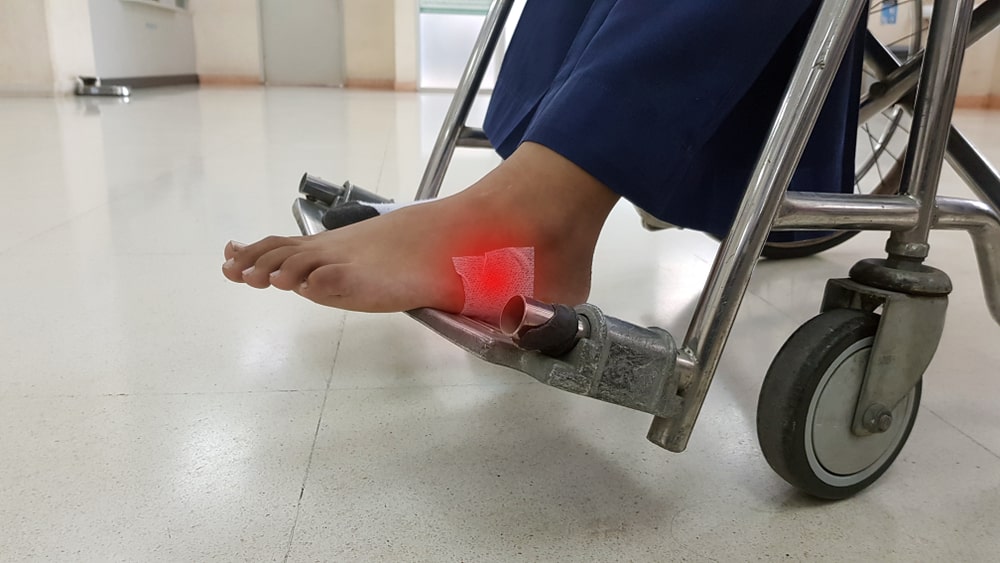
Nearly 420 million adults in the United States have diabetes, and of those, at least one quarter will develop at least one diabetic foot ulcer, a slow-healing sore that can lead to serious complications. [i] These open wounds are more likely to develop in those with diabetes because the disease can cause nerve damage (neuropathy), making it hard for patients to feel when constant pressure or an injury has broken the skin. Diabetes can also cause peripheral artery disease, decreasing blood flow to the feet and making it harder for the body to fight off infection and heal wounds. When these factors combine, they can turn an ordinary blister or cut into an injury that takes weeks or months to heal, possibly leading to infection, hospitalization, and worse.

Normal healing is a complex process at the cellular level. First, different types of immune cells cleanse a wound of pathogens, dead cells, and debris. After this initial inflammatory phase, new blood vessels form to support growing skin cells and supply them with oxygen as they strengthen and close the wound. Eventually, healthy scar tissue covers the former injury entirely.
In diabetics, this process is disrupted, resulting in wounds that do not heal properly and which frequently recur when not carefully treated. This is because the first inflammatory stage of healing is prolonged due to the underlying disease. While inflammation serves a critical purpose at the beginning of wound healing, when it goes on too long, it impairs the body’s ability to form the blood vessels essential for supporting new healthy skin. The skin that does form is thin, weak and prone to re-injury.
This is why it is essential for patients with diabetic foot ulcers to consult with a podiatrist experienced in the management of complex wounds. Incomplete and ineffective healing puts them at risk for infection, re-injury, and possibly amputation. To achieve the best possible result, you need holistic care that treats your wound with advanced techniques to promote complete healing and addresses the underlying contributing factors.
At Corona Foot and Ankle Group, our wound management is not simply about treating the visible ulcer. For long-term well-being, we need to understand the possible risk factors a patient may be experiencing to develop an individualized plan that supports healing and prevents future recurrence.
An important part of this process is assessing complicating factors such as neuropathy and poor circulation, to be sure that your treatment plan appropriately takes these into account. We also look at your overall state of health, to be sure that your blood sugar levels and blood pressure are well managed and that your overall nutrition is good.
In caring for your wound, we may need to remove dead tissue that impairs the healing process. As your ulcer heals, we will carefully track and assess progress with measurements and visual inspection, noting any signs that might indicate a developing infection or complication that would prompt a change in treatment. Our team is experienced not only with the appropriate techniques for topical wound management, but also advanced techniques for difficult wounds that are slow to heal, such as skin substitute grafts that support the body’s development of healthy new skin.
Because the potential consequences of diabetic foot ulcers are so severe, we work closely with our diabetic patients to prevent sores from developing in the first place. Important but simple strategies include reducing pressure spots through the use of diabetic shoes, regular foot exams in our office, and daily self-inspection to catch small issues before they become difficult to treat.
When you’re dealing with foot ulcers that won’t heal or keep coming back, you need advanced care to avoid infection or amputation. The specialists at Corona Foot and Ankle will use the latest, most effective techniques available to preserve your limb and your health. To find out more about our treatments for diabetic foot ulcers, contact us here.
[i] https://www.woundsource.com/blog/complex-wound-management-diabetic-foot-ulcers
Have any questions about treatment? Feel free to make an appointment, Our team will reach you soon!
Contact Us